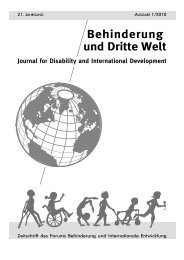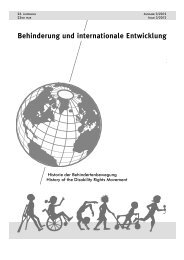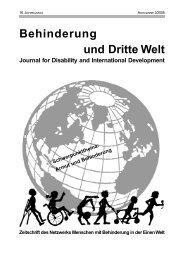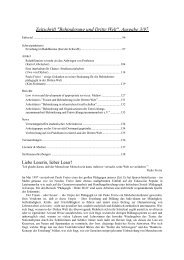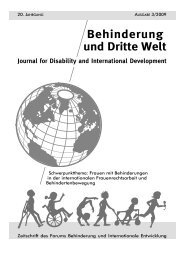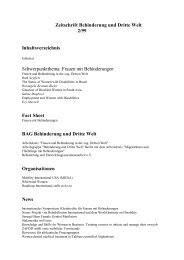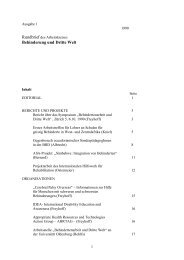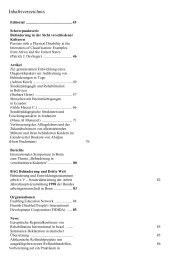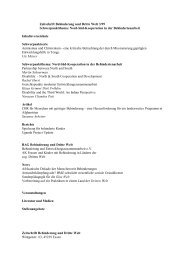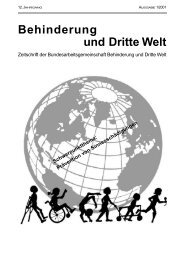Bundesarbeitsgemeinschaft Behinderung und Dritte Welt - Zeitschrift ...
Bundesarbeitsgemeinschaft Behinderung und Dritte Welt - Zeitschrift ...
Bundesarbeitsgemeinschaft Behinderung und Dritte Welt - Zeitschrift ...
Sie wollen auch ein ePaper? Erhöhen Sie die Reichweite Ihrer Titel.
YUMPU macht aus Druck-PDFs automatisch weboptimierte ePaper, die Google liebt.
mental picture of each one of them. The cutting of<br />
such raw food stuffs are usually monitored by the<br />
teachers. All children are made to participate. Some<br />
can fan the fire, others are guided to cut into pieces<br />
the yam, for example, and stay aro<strong>und</strong> to finish<br />
cooking it.<br />
Principles in teaching deaf-blind<br />
Teaching is one-to-one approach for the low functioning<br />
pupils. However, some teachers have a maximum<br />
of three pupils who are at high functioning<br />
level. Since hearing and sight are the main problems,<br />
many activities are action packed using the<br />
body movement, feelings and touching the bodies of<br />
the teacher and the materials to learn about. Much of<br />
sign language for the deaf is used. Others are gestures,<br />
miming and multi-sensory approach, such as,<br />
tactual (touch), kinaesthetic (feeling) and vibration.<br />
Besides, patience and devotion on the part of the teachers<br />
are of utmost importance since five of the<br />
pupils at the centre have some amount of mental<br />
retardation, and they can learn at their own pace.<br />
This implies that there are children with high functioning<br />
level and these do not need pervasive support<br />
as others who may need it all the time. As a result of<br />
memory loss or lack of retention, same task is repeated.<br />
Repetition is a cornerstone of memory retention<br />
of a particular task. Task analysis is another essential<br />
method teachers use by breaking a major task into<br />
chunks or bits for the learner to grasp before the next<br />
step is tackled.<br />
Communication Modes<br />
Sign language, braille, gestures, writing, brailling<br />
and miming are the main modes of communication<br />
adapted. Nevertheless, two of the older children who<br />
are low vision can write and braille. The younger<br />
ones are now learning to braille. Four of them who<br />
have stayed for ten years in the school for deaf and<br />
have now been transferred to the deaf-blind department<br />
due to eye problem, are perfect in sign language<br />
for the deaf.<br />
Equipment and Materials<br />
The CBM has provided the centre with braille<br />
machines and braille sheets and jigsaw puzzles.<br />
There are equipment for games, such as, ludo, draft,<br />
footballs and panorama. Other facilities are play<br />
gro<strong>und</strong>, two big classrooms, two toilets and a library<br />
which children share with the deaf.<br />
Uniqueness of the Pupil<br />
Uniqueness of these children are in art, craftmanship<br />
and drumming, finished products of woven mufflers,<br />
door mats and table mats are some of the exhibits in<br />
ARTIKEL<br />
the stores for sale and for exhibition purposes. One<br />
of the pupils is talented in drumming and belongs to<br />
the cultural troupe of the demonstration school for<br />
the deaf. Another pupil is an excellent artist who<br />
drew Princess Ann of London and former President<br />
Jerry John Rawlings of Ghana during the princess’s<br />
visit in the year 2000. He also draws instructional<br />
aids for teachers in the demonstration school and the<br />
Department of the Deaf-Blind. Many of the children<br />
can sweep the school compo<strong>und</strong>, wash uniforms,<br />
plant and water the vegetable garden they have<br />
made.<br />
Parental Role<br />
Parents’ greatest problem is communication and management<br />
of their wards. The solution is to organize<br />
workshops for all parents once in the year to educate<br />
each parent on what his/her ward is capable of<br />
doing so that there is a carry over to the home. The<br />
workshop starts from a Wednesday to Saturday after<br />
which parents take their wards home. Parental collaborative<br />
role is one of the major educational aspects<br />
of deaf-blind education.<br />
Problems<br />
Teachers are not trained for deaf-blind education<br />
solely since the programme they pursue is not purely<br />
for deaf-blind education at the University College<br />
of Education of Winneba. Government’s financial<br />
support covers only a portion for the children’s education<br />
and does not extend to areas of equipment,<br />
instructional materials and school uniforms. The<br />
educational programme is patterned on deaf education<br />
hence the use of sign language for the deaf. Sign<br />
language for the deaf-blind is neglected. Rather,<br />
sign language for the deaf are taught to the children.<br />
The reason given was that, since the children are<br />
residing with the deaf, they could only learn the language<br />
they commonly interact with the deaf. It is<br />
also observed that, skills learnt in the school are lost<br />
as children go home since there is no follow up programme.<br />
Besides, parents are more superstitiously<br />
inclined to the children’s problems and tend to work<br />
for the children instead of helping them to become<br />
independent. There are no craft instructors which<br />
can expose children to different skills. In addition,<br />
many of the children have low intellectual functioning<br />
levels so cannot pursue higher academic work<br />
and gain employment. There are no workshops and<br />
no exclusive transport for the deaf-blind. The lack of<br />
transportation precludes out reach programmes<br />
which can educate the public on achievements, causes<br />
and prevention of deaf blindness.<br />
105 <strong>Zeitschrift</strong> <strong>Behinderung</strong> <strong>und</strong> <strong>Dritte</strong> <strong>Welt</strong> 3/2001<br />
105



